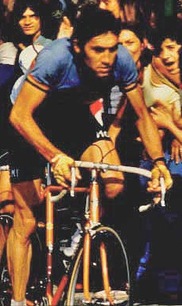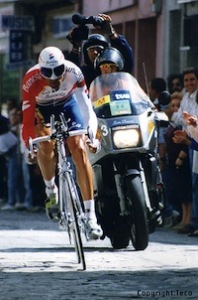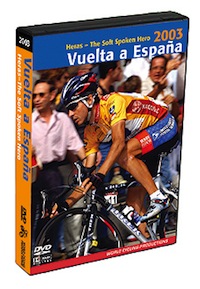 It’s not that I’m an unsentimental guy. I love wool jerseys, lugged steel, and wild, untamed sideburns flowing down from scraggly, unhelmeted mats of hair. These things are all great images of what was a golden age for cycling, between the true professionalization of the sport in the late 60’s, and doping specter of the 1990’s.
It’s not that I’m an unsentimental guy. I love wool jerseys, lugged steel, and wild, untamed sideburns flowing down from scraggly, unhelmeted mats of hair. These things are all great images of what was a golden age for cycling, between the true professionalization of the sport in the late 60’s, and doping specter of the 1990’s.
But that era of cycling is gone. Gone like 30-cents-a-gallon gasoline, slide rules and Jim Crow laws. Yet for some reason, there are large groups of people out there who not only think we should try to bring it all back, but that doing something as simple banning radios would be the fastest way to achieve this. I gotta say, it doesn’t make a whole lot of sense to me. Where should I begin?
Let’s start by addressing the radio issue. Does the anti-radio contingent have no sense of history? Do they not know that riders have been communicating with coaches and directors for as long racing has existed? Did not having a radio prevent Greg Lemond from being held back on Luz-Ardiden so Bernard Hinault could win the 1985 Tour?
Conversely, did radio communication prevent Erik Dekker from ignoring his director and continuing to pull through as he and Armstrong broke away in the ’01 Amstel Gold race? Of course not. A DS can be as brilliant as he wants, but ordering riders around isn’t like moving chess pieces.
If a rider has ridden foolishly and burnt all his matches, or is out of position, or is simply just not paying attention, at the critical moment all the designs of the most brilliant tactician will crumble in an instant. People who think radios make the riders into mindless automaton, powered by some puppeteer driving a festively-painted Skoda half-a-mile down the road need to spend more time racing and less time watching it on TV.
 If you’re still convinced that radios brought about today’s “boring” racing, how do you explain the fact that “boring” riders have long been dominant in professional cycling? It’s been stated many times (I think that Lance even mentions it in one of his books) that Johan Bruyneel wasn’t the first DS to try and use radios, he was just the first one to make them actually work. This would mean that Miguel Indurain rolled all over the Tour de France (and a couple Giros and Vueltas besides) with a style at least as dull as The Texan’s, and without the aid of a radio.
If you’re still convinced that radios brought about today’s “boring” racing, how do you explain the fact that “boring” riders have long been dominant in professional cycling? It’s been stated many times (I think that Lance even mentions it in one of his books) that Johan Bruyneel wasn’t the first DS to try and use radios, he was just the first one to make them actually work. This would mean that Miguel Indurain rolled all over the Tour de France (and a couple Giros and Vueltas besides) with a style at least as dull as The Texan’s, and without the aid of a radio.
And Jacques Anquetil, who won 5 Tours de France in his day, never needed a radio to keep tabs on his opponents in the hills before summarily dissecting them in the time trials. At the time, many found Anquetil’s generally dry dominance as dull as today’s viewers find Armstrong’s. Now consider that little battle on Puy de Dome between Anquetil and Raymond Poulidor; it’s a classic moment of cycling history, right? But was that really any different than Armstrong’s marking Pantani on the climb to Ventoux in 2001?
Which brings me to my second point: honestly, I just don’t think today’s racing is all that boring. I dunno, maybe everyone who disagrees was busy taking a dump or something during year’s (2005) Giro, but it wasn’t exactly a snoozer. And while the Tour GC has been duller than stale pancakes for almost a decade now, its points competition and individual stages are as hotly contested as ever. This year’s Gent-Wevelgem, the ’04 Paris-Roubaix, and the ’03 San Remo (to name a few) were all memorable and exciting races, even with the radios going full blast.
In fact, if you really want to see what happens when you take the radios out of the modern peloton, check out this year’s Amstel Gold Race. Fog kept the helicopters (and thus the TV cameras and radio repeaters) out of action, and the race unfolded as dull and predictable as any Cat 4/5 road race with a hilltop finish. I mean, maybe you think watching a yellow-clad Eddy Merckx put six minutes in to the field by attacking on the second col of the day is more thrilling than watching Lance wait until the final climb to pad his lead, but honestly, I don’t see much of a difference.
“Oh, come on,” you tell me. “I just watched this old race on DVD, and racing used to be way more aggressive way back when.” Have you not seen SportsCenter? Are you unfamiliar with the concept of the highlight reel? In 2003, the eccentric father of a friend of mine taped every second of OLN’s Vuelta coverage. It took four, six-hour VHS tapes. And keep in mind, that’s just the TV footage; most stages run hours longer than they’re televised for.
 However, when you buy the ’03 Vuelta DVD from World Cycling Productions, those 24 hours have been chopped down to 4.5. The ’89 Tour, like many of the older videos at WCP, runs a mere 90 minutes. All respect due to Lemond and Fignon’s epic duel, but hell, with only 90 minutes to fill, you could make the ’04 TdF, one of the most lopsided, pointless blowouts in the history of sport, into a nail-biter. Of course, since you remember getting up at 6:30 each morning to be bored to death by the 24-hour cut, the ’04 Tour will never seem as exciting as better-edited-but-similarly-mismatched contests from the past.
However, when you buy the ’03 Vuelta DVD from World Cycling Productions, those 24 hours have been chopped down to 4.5. The ’89 Tour, like many of the older videos at WCP, runs a mere 90 minutes. All respect due to Lemond and Fignon’s epic duel, but hell, with only 90 minutes to fill, you could make the ’04 TdF, one of the most lopsided, pointless blowouts in the history of sport, into a nail-biter. Of course, since you remember getting up at 6:30 each morning to be bored to death by the 24-hour cut, the ’04 Tour will never seem as exciting as better-edited-but-similarly-mismatched contests from the past.
But whether today’s racing is actually less exciting or not, saying that banning radios will improve modern cycling makes as about much sense as saying that deporting immigrants will cure America’s problems. I mean, it appeals to the dumbest, most basic human logic; you think back to the the “good old days,” then see all the “bad” things in the world in the present, and think to yourself “what’s changed?” It’s hard to miss all those brown-skinned, Spanish-speaking folks down at the City Market, and they didn’t used to be here, so you conclude “it was those danged Mexicans that screwed everything up!” Simple, right? Yes, and completely wrong.
It’s easy to see the changes in bike racing between the Merckx and Armstrong eras, just as it’s easy to see the changes in pretty much anything between 1970 and now. And though these newfangled radios are easy targets to blame for those changes, they’re just one of a myriad of contributing factors, including lighter bikes, more advanced equipment, more sponsor support, a narrower range of talent, increasing professionalization, internationalization, better roads, more TV coverage, drugs, drug testing, a longer season, better training and nutrition, more rider specialization and God knows what else.
So unless you plan to get rid of all these other “vices” (also referred to “improvements”, “advances” and “breakthroughs”—with a few exceptions) it really doesn’t make a whole heck of a lot of sense to get rid of radios, does it? In all honestly, the only thing banning radios would change is the minds of the people who wanted them banned in the first place.
In “A Day Without A Mexican,” California falls to shit when all the Mexicans in California disappear.
Likewise, without radios, might bike racing fall apart?
Well said Cosmo!
Mags
https://roadrace1.blogspot.com/
Disagree with the article – there’s a lot of complete irrelevance in there – I mean what have lighter bikes and sponsor support got to do with it ?
I think racing is more sterile than it was – and I think radios are part of that. It’s true that the DS has always communicated with the rider but not in such an immediate and continuous way. Ban radios and let’s see what happens – if the racing doesn’t improve or it gets worse well then we can always go back can’t we.
The conservative ones are those that refuse to experiment.